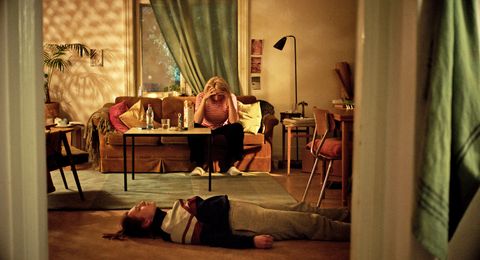What to Watch Verdict
While some of the animation is more miss than hit, Ninjababy is a gentle love story brimming with earnest questions about the paths you don’t get to choose in life.
Pros
- +
👶 The bits of hand-drawn animation are often a credit to both movies and graphic novels.
- +
👶 Nader Khademi has Future Internet Boyfriend written all over him.
- +
👶Kristine Kujath Thorp is an international star in the making
Cons
- -
👶 The movie might be called Ninjababy, but Ninjababy himself kind of sucks.
Ninjababy is part of our SXSW 2021 coverage. You can find all of our reviews here.
Over the past few years, audiences have been gifted with many good movies about unwanted pregnancies. In focusing on reproductive health stories, these films can tackle broader societal narratives, such as the uncertainty millennials face around family issues and the complicated healthcare systems found around the world. Ninjababy, the new film from Norwegian director Yngvild Sve Flikke, is a welcome addition to this canon, adding its heartfelt takes on parenthood and adoption.
When struggling artist Rakel (Kristine Kujath Thorp) discovers that she’s pregnant, she assumes the baby belongs to recent one-night stand Mos (Nader Khademi). But the budding couple is in for another surprise: Rakel is six-and-a-half months pregnant, meaning Mos could not possibly be the father. Rakel is forced to retrace her steps, all the while voicing her frustration at a fetus that did not have the courtesy to make its presence known earlier. “It’s just a fucking rotten sneaky ninjababy,” she shouts, “who thinks it can chill there for nine months and then sneak out.”
So begins a personal purgatory where Rakel is forced to tell her loved ones that she is only months away from giving birth despite a flat belly and minimal symptoms. This includes the baby’s biological father—a drug-dealing lothario who we know as Dick Jesus (Arthur Berning)—who uses Rakel’s decision to put the baby up for adoption as an excuse to get her back in bed. But when Mos, undeterred by her pregnancy, reenters the picture, a complicated situation becomes even more challenging to sort out.
Much like its central character, Ninjababy has the potential to be many things. Flikke’s film pulls back the curtain on the complicated—and often affluent—world of adoptions while simultaneously offering a coming-of-age story about two well-meaning adults. The film is also a reminder that graphic novels are not synonymous with superheroes, offering nods to award-winning autobiographies like Marjane Satrapi’s Persepolis and Craig Thompson’s Blankets.
In its best moments, though, Ninjababy echoes the warmth of Gillian Robespierre’s Obvious Child, another film about an unwanted pregnancy and a romance centered on kindness. Thorp is a revelation, carrying the movie’s weight in her eyes and making even the most manufactured moments of the film feel grounded. Meanwhile, Khademi brings the dream boyfriend to life, radiating empathy and decency each moment he appears onscreen. In one standout sequence, Mos explains how—even after three chance encounters—he has still learned enough about Rakel to know why he likes her. It’s a caliber of writing any romantic comedy would kill to call its own.
In skipping ahead two trimesters, Ninjababy also prepares a very different set of questions regarding unwanted pregnancies. Rakel is too far along to qualify for an abortion, but her ignorance about her pregnancy—she frantically relays to her roommate Ingrid (Tora Christine Dietrichson) the many times she’s gotten drunk or done drugs over the past six months—raises legitimate concerns about the health of her baby. She is also frustrated by the opacity of the adoption process. This frustration causes Rakel to crash an adoption support group, peppering each set of future parents with questions about their white privilege before fleeing when confronted herself.
As the story progresses, Flikke and Sætre use hand-drawn illustrations to capture Rakel’s uncertainty about her future. Ninjababy was adapted from Inga Sætre’s graphic novel The Art of Falling and contains original artwork and animations from the Norwegian artist. Most of the time, these illustrations add a visual flourish to the young woman’s moods. Watch the smattering of sparks that fly every time Rakel indulges her attraction to Mos or the way strangers’ faces are scratched out when Rakel’s anxiety about her pregnancy pushes its way to the surface. These little touches find a gentle medium between illustration and cinema and show the full potential for other autobiographical works of art on the screen.
There are also times when the illustrations work against the film. Whenever Rakel’s imagination brings forth the title character—a crude sketch of a baby in an eye mask who maintains a running commentary on the potential adoption candidates in their life—the forced nature of these moments undermines Thorp’s gifts as an actress. On paper, Ninjababy is meant to represent her crude, youthful self and the responsibilities she fears, but the character never gains any real traction, especially when the rest of the cast has chemistry this strong. There are other ways to visualize her internal monologue; Ninjababy would be a much stronger film without this one.
Ultimately, the fact that Ninjababy has no real epiphanies to offer its audience might be its biggest strength. If you decide—or if it is chosen for you—that you will carry a pregnancy to term, there are no rules that require you to have a consistent perspective on this decision. It does not shy away from this uncertainty, allowing Rakel the emotional space to be and remain uncertain even through to the final credits. This may not provide us with the pat endings we like in our comedies, but in the hands of an actress as skilled as Thorp, there is still plenty of closure to be found by taking things one day at a time.
Matthew Monagle is an Austin-based film and culture critic. His work has appeared in a true hodgepodge of regional and national film publications. He is also the editor and co-founder of Certified Forgotten, an independent horror publication.


